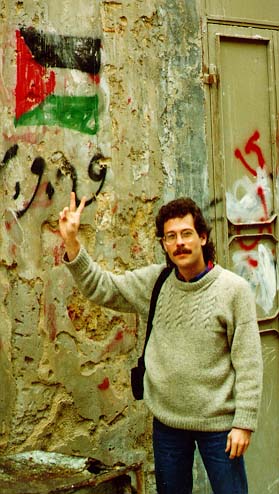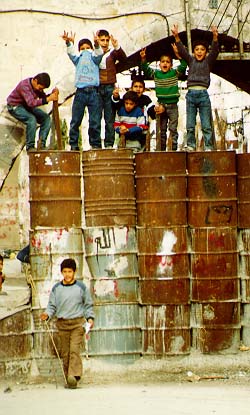

Selected Writings:
International Solidarity


Canadian Tribune
January 9, 1989
Chris Frazer recently visited the occupied territories with a delegation of the World Federation of Democratic Youth, invited by the General Union of Palestinian Students, to observe the anniversary of the Intifada. This eyewitness report is the first in a series about the Palestinian uprising from the occupied West Bank.
By Chris Frazer
 Entering Balata refugee camp is hazardous enough when it�s not under
curfew or closed as a �military zone�. But tensions were running high
throughout Israel and the occupied territories, and on December 10, the
army closed Balata along with much of the West Bank and the entire Gaza
Strip.
Entering Balata refugee camp is hazardous enough when it�s not under
curfew or closed as a �military zone�. But tensions were running high
throughout Israel and the occupied territories, and on December 10, the
army closed Balata along with much of the West Bank and the entire Gaza
Strip.
The face of the Israeli occupation had turned extremely grim as it suffered one setback after another. While Yasser Arafat and the PLO scored successive points in the international arena, Israel limped along in a political crisis that even prevented the formation of a new government.
To make matters worse, the Israeli Defense Forces (IDF) had, in the previous two days, failed to control or prevent Palestinian protests marking the first anniversary of their popular uprising � the Intifada.
Balata and the Arab city near which it lies, Nablus, are well-known as "barometers" of the Intifada. And it was there that we came to witness the strength of this uprising after one year of struggle.
The road to Nablus was choked with IDF patrols and check-points, but it�s also on the way to Nazareth, a natural point of interest for many tourists visiting the Holy Land, and we managed to bluff our way through to arrive at our destination.
Strolling through Nablus, en route to nearby Balata, the signs of the Intifada were clear and fresh. As in every Palestinian city and village, graffiti and hand-painted Palestinian flags adorned every available building and wall. In Nablus, the IDF has failed to force the local population to whitewash slogans and symbols of struggle from sight.
Women and children greeted us constantly with the two-fingered "V for victory" salute. But there were no young men doing so. They weren�t anywhere to be seen, and soon learned the reason why.
Around the next corner we stumbled across an IDF patrol searching for the young activists who had confronted the army in a demonstration only an hour before. We watched in shock as two soldiers turned back an ambulance rushing to the aid of a Palestinian youth shot during the protest.
Within seconds after the soldiers moved on, a crowd of young people appeared from nowhere suddenly, rushing to carry their fallen comrade to safety. Our shock turned to horror as the soldiers turned and raised their rifles to open fire on these rescuers. Remarkably, the youths retreated safely down labyrinthine side streets.
As the IDF soldiers passed by, we could clearly see their fearful expressions, bringing to mind the words of a friend, Ziad, who told us three earlier that, "The Israelis are more afraid of us with our stones, than we are them with their weapons, beatings and prisons."
Still, it didn�t take much urging from our Palestinian guides � women younger than twenty years old � to hurry us on our way to Balata.
It was decidedly easier entering Balata than leaving afterwards. We had not been in the camp for an hour before all hell broke loose. Our attempt to meet with the camp leader ended abruptly when a wave of tremendous excitement swept through the crowd of young children who had surrounded us since our arrival.
 The kids began rushing to a nearby wall which enclosed the camp, and
began to hail stones over it at a target we could see at first. Then
we spotted the object of their agitation � a mechanized IDF unit
wending its way down the hillside road towards the camp.
The kids began rushing to a nearby wall which enclosed the camp, and
began to hail stones over it at a target we could see at first. Then
we spotted the object of their agitation � a mechanized IDF unit
wending its way down the hillside road towards the camp.
Suddenly the crackle of gunfire burst out rapidly � tak! tak! tak! � and we realized the camp was under assault. Rather than retreat, the children replied with an even more intense hail of stones, thrown more in sheer defiance than in any hope of reaching their targets.
Then a series of explosions pierced the shouting and chaos, and tear-gas canisters sailed through the air and into the camp, spewing poisonous CS gas.
Our lungs choked and our eyes burned as we retreated with the crowd towards the safety of nearby homes. The hasty retreat necessitated a quick sprint across the only road leading into the camp � upon which the IDF were advancing and firing at that very moment.
As we risked this potentially deadly dash, a handful of older youths gathered to delay the army with a barrage of well-aimed stones. They gave everyone time to clear the area and disappear from sight.
Strangers hustled us into their home, ignoring the risk involved. From the rooftop of our sanctuary, we watched the army enter the camp, and soon discovered the miracle of the "people�s telegraph" � a system of rooftop communication and surveillance that tracked the movement of the IDF through the camp.
We also learned that most of the camp�s young people, men and women alike, had gathered for a protest against the invasion of the camp, an action that, to our benefit, drew the army�s attention and covered our escape from Balata.
The all-clear signal arrived and we slipped into a side-street and down an alley-way with a young guide. But this was a premature move. A quick warning from hidden lookouts stopped us in our tracks. At a single whispered word from our guide � "Jaysh" (army) � the door of another house immediately unbolted and gave us temporary shelter.
Following a tense wait, we finally navigated a maze of side-streets and alleys to the edge of Balata, where we hustled into a van that slipped past the IDF�s rooftop observation posts. We arrived back at our own car in Nablus and returned to the relative calm of Jerusalem.
The IDF units sweeping through Nablus and Balata, incredible as they were to our experience, are regarded by Palestinians as everyday facts of life.
The events we witnessed that day were damage control efforts carried out by the IDF in the wake of Palestinian protests commemorating the first anniversary of the Intifada. Similar things might have happened on any other day, and for any other reason.
But it hadn�t been just any other day, and this was the salient fact. The anniversary of the Intifada was a test of will and nerves between the Palestinian people and the forces of occupation. And it�s clear that the Intifada emerged as the moral victor in this round of a deadly struggle.
The Intifada has become a state of mind for the Palestinians, and this the army cannot control. We were told time and again by Palestinians like Suleiman, a university student in Jerusalem, that "We want our independence and freedom. We don�t want to kill or be killed, but if we have to die, we will. We are not afraid of the Israelis."
The United Leadership of the Intifada called for demonstrations and a two-day general strike on the anniversary of the uprising, December 8-9. The people responded and defied every attempt by the Israeli state to crush the actions.
The Palestinians have become masters in the tactics of the Intifada. They have maintained continuous strike actions every day for a year. Shops close and workers leave the job every day at noon. Young people demonstrate every day at 10:30 a.m.
Ismail, a twenty-two year-old friend from Ramallah, put Palestinian morale in perspective: "In 1967, the Israeli army defeated all the armies of the Arab countries in six days, occupied our land and destroyed our morale and self-respect. In 1982, it took the Israeli army six weeks to push the PLO fighters out of Beirut. And in the last year, they have been unable to stop an uprising of unarmed people."


 on February 5, 1999
on February 5, 1999
